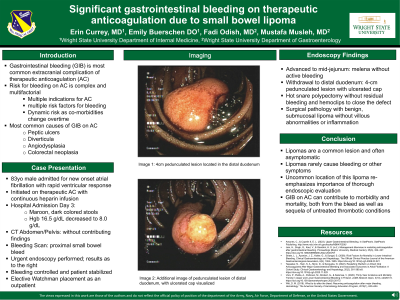Monday Poster Session
Category: GI Bleeding
P2082 - Significant Gastrointestinal Bleeding on Therapeutic Anticoagulation Due to Small Bowel Lipoma
Monday, October 23, 2023
10:30 AM - 4:15 PM PT
Location: Exhibit Hall

Has Audio

Erin Currey, MD
Wright State University Boonshoft School of Medicine
Fairborn, OH
Presenting Author(s)
Erin Currey, MD1, Emily Buerschen, DO1, Fadi Odish, MD2, Mustafa Musleh, MD1
1Wright State University Boonshoft School of Medicine, Fairborn, OH; 2Wright State University Boonshoft School of Medicine, Dayton, OH
Introduction: Gastrointestinal bleeding (GIB) is the most common extracranial cause of major bleed in patients requiring therapeutic anticoagulation, affecting 5-15% of patients. Yet, assessing patient risk for bleed can be clinically challenging; as anticoagulation is indicated in a variety of pathologies with diverse clotting and bleeding risks. GIB in the setting of therapeutic anticoagulation is commonly related to peptic ulcers, diverticula, angiodysplasia and colorectal neoplasia. Rarely, gastric lipomas are identified as the etiology.
Case Description/Methods: We present a case of a benign, submucosal small bowel lipoma as a cause of severe GIB. The patient was an 83-year-old male admitted to a tertiary facility for the management of new-onset atrial fibrillation with rapid ventricular rate and associated heart failure exacerbation. Pertinent past medical history included congestive heart failure and type 2 diabetes. He was initiated on therapeutic anticoagulation with continuous heparin infusion. Three days after the initiation of heparin, the patient began having dark, maroon-colored stool concerning for GIB. Bleeding became overtly concerning when he developed acute anemia with a hemoglobin drop from 16.5g/dL to 8g/dL within 48 hours. CT imaging was benign. However, a bleeding scan then revealed a bleed in the proximal small bowel and he required urgent enteroscopy. The enteroscope was advanced into the mid-jejunum, where melena without active bleeding was visualized. The scope was slowly withdrawn to the distal duodenum, where an unusual 4-cm pedunculated lesion with an ulcerated cap was discovered. Hot snare polypectomy was performed successfully without residual bleeding and hemoclips were placed to close the defect. Interestingly, surgical pathology revealed this mass was a benign, submucosal lipoma. The patient’s hemoglobin stabilized in the following days, and he ultimately elected for Watchman Device placement and has not had recurrence of GIB to date.
Discussion: Lipomas are common benign lesions found within the gastrointestinal tract. However, they rarely can cause symptoms or bleeding. This uncommon location for a lipoma re-emphasizes the importance of thorough endoscopic evaluation. Our case demonstrates an unusual case of small bowel bleeding due to a lipoma as well as our successful management strategy.

Disclosures:
Erin Currey, MD1, Emily Buerschen, DO1, Fadi Odish, MD2, Mustafa Musleh, MD1. P2082 - Significant Gastrointestinal Bleeding on Therapeutic Anticoagulation Due to Small Bowel Lipoma, ACG 2023 Annual Scientific Meeting Abstracts. Vancouver, BC, Canada: American College of Gastroenterology.
1Wright State University Boonshoft School of Medicine, Fairborn, OH; 2Wright State University Boonshoft School of Medicine, Dayton, OH
Introduction: Gastrointestinal bleeding (GIB) is the most common extracranial cause of major bleed in patients requiring therapeutic anticoagulation, affecting 5-15% of patients. Yet, assessing patient risk for bleed can be clinically challenging; as anticoagulation is indicated in a variety of pathologies with diverse clotting and bleeding risks. GIB in the setting of therapeutic anticoagulation is commonly related to peptic ulcers, diverticula, angiodysplasia and colorectal neoplasia. Rarely, gastric lipomas are identified as the etiology.
Case Description/Methods: We present a case of a benign, submucosal small bowel lipoma as a cause of severe GIB. The patient was an 83-year-old male admitted to a tertiary facility for the management of new-onset atrial fibrillation with rapid ventricular rate and associated heart failure exacerbation. Pertinent past medical history included congestive heart failure and type 2 diabetes. He was initiated on therapeutic anticoagulation with continuous heparin infusion. Three days after the initiation of heparin, the patient began having dark, maroon-colored stool concerning for GIB. Bleeding became overtly concerning when he developed acute anemia with a hemoglobin drop from 16.5g/dL to 8g/dL within 48 hours. CT imaging was benign. However, a bleeding scan then revealed a bleed in the proximal small bowel and he required urgent enteroscopy. The enteroscope was advanced into the mid-jejunum, where melena without active bleeding was visualized. The scope was slowly withdrawn to the distal duodenum, where an unusual 4-cm pedunculated lesion with an ulcerated cap was discovered. Hot snare polypectomy was performed successfully without residual bleeding and hemoclips were placed to close the defect. Interestingly, surgical pathology revealed this mass was a benign, submucosal lipoma. The patient’s hemoglobin stabilized in the following days, and he ultimately elected for Watchman Device placement and has not had recurrence of GIB to date.
Discussion: Lipomas are common benign lesions found within the gastrointestinal tract. However, they rarely can cause symptoms or bleeding. This uncommon location for a lipoma re-emphasizes the importance of thorough endoscopic evaluation. Our case demonstrates an unusual case of small bowel bleeding due to a lipoma as well as our successful management strategy.

Figure: 4-cm pedunculated lesion with an ulcerated cap, found to be a benign, submucosal lipoma, visualized in the distal duodenum
Disclosures:
Erin Currey indicated no relevant financial relationships.
Emily Buerschen indicated no relevant financial relationships.
Fadi Odish indicated no relevant financial relationships.
Mustafa Musleh indicated no relevant financial relationships.
Erin Currey, MD1, Emily Buerschen, DO1, Fadi Odish, MD2, Mustafa Musleh, MD1. P2082 - Significant Gastrointestinal Bleeding on Therapeutic Anticoagulation Due to Small Bowel Lipoma, ACG 2023 Annual Scientific Meeting Abstracts. Vancouver, BC, Canada: American College of Gastroenterology.
